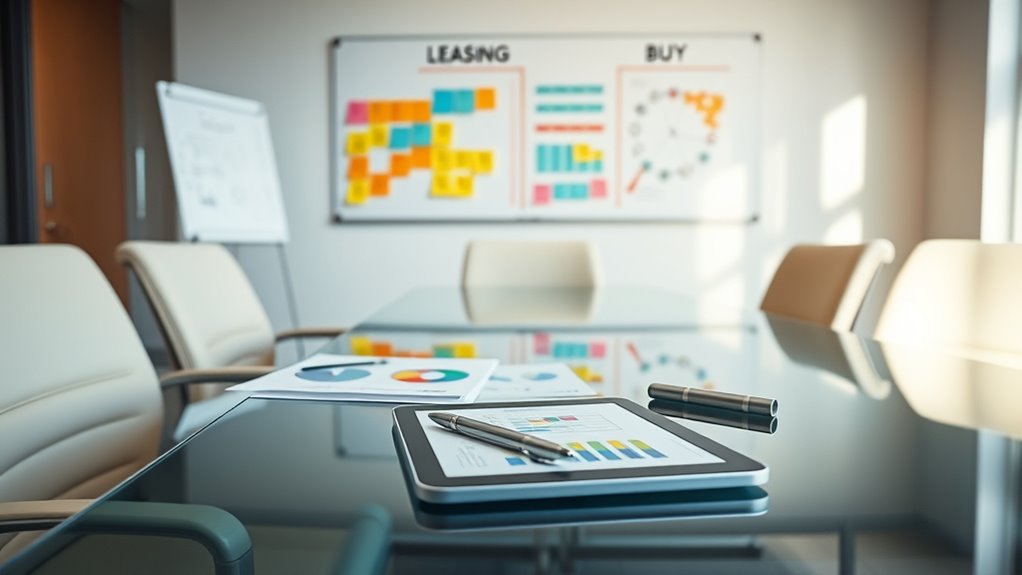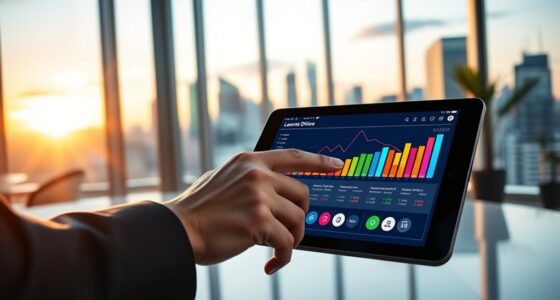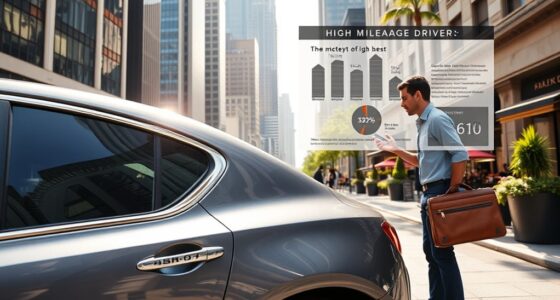When deciding to lease or buy, consider your cash flow, tax benefits, and equipment upgrades. Leasing offers predictable monthly payments, easing budgeting and providing flexibility for technology upgrades, while buying ties up capital but can be more cost-effective long-term if the equipment lasts. Think about your business’s growth and how quickly technology changes. Exploring these factors will help you make smarter choices, and you’ll discover more key insights ahead.
Key Takeaways
- Evaluate total costs, including upfront payments, ongoing expenses, and resale value, to determine long-term financial impact.
- Consider cash flow flexibility; leasing reduces initial investment and offers tax deductions, aiding predictable budgeting.
- Assess equipment lifespan and technological relevance; leasing simplifies upgrades, while buying benefits long-term ownership.
- Analyze tax benefits: leasing provides immediate deductions, whereas buying allows depreciation over time.
- Match your operational needs and business growth plans with leasing flexibility or ownership stability for optimal decision-making.

Deciding whether to lease or buy equipment is a crucial choice that can considerably impact your business’s finances and operations. To make the right decision, you need to perform a thorough cost analysis. This involves comparing the total costs associated with each option, including upfront payments, ongoing expenses, maintenance, and eventual disposal or resale value. When you lease, you typically pay a fixed monthly fee, which can help with predictable budgeting and easier cash flow management. Buying, on the other hand, often requires a substantial upfront investment, which might strain your cash reserves but could lead to long-term savings if the equipment lasts many years.
Your cash flow is an essential factor in this decision. Leasing usually requires less initial capital, freeing up cash for other business needs, like inventory or marketing. Plus, lease payments are often tax-deductible as an operating expense, providing some immediate financial relief. Buying might make sense if you have enough cash on hand and prefer to own the asset outright, avoiding ongoing lease payments. However, it can tie up capital that could be used elsewhere, potentially hampering your ability to respond to sudden opportunities or emergencies.
Leasing reduces initial costs and offers tax benefits, while buying ties up capital but provides long-term ownership.
Another aspect to contemplate is how quickly your equipment becomes outdated or obsolete. If technology advances rapidly in your industry, leasing might be smarter because you can upgrade more easily at the end of each lease term. This way, you stay current without the hassle of selling old equipment or dealing with its depreciation. Conversely, if your equipment has a long lifespan and retains value, buying could be more economical in the long run since you can continue to use or sell it after the initial investment.
Tax implications also play a role. Leasing payments are typically fully deductible as business expenses, which can reduce your taxable income immediately. Buying allows you to depreciate the asset over its useful life, offering deductions over several years. Your choice depends on your tax strategy and financial goals.
Additionally, considering the contrast ratio of home cinema projectors can help determine image quality and how well your content displays in different lighting conditions. Lastly, think about your operational flexibility. Leasing often provides more flexibility to adjust your equipment needs as your business evolves. If your business environment is dynamic, leasing can reduce the risk of being stuck with outdated or unnecessary equipment. Buying is better if you prefer long-term control and plan to use the asset for many years, minimizing ongoing payments and maximizing ownership benefits.
Frequently Asked Questions
How Does Tax Impact Lease Versus Buy Decisions?
Tax implications play a big role in lease versus buy decisions, as they can sway your choice. When you buy, you might get depreciation benefits that reduce your taxable income over time. Leasing often offers immediate tax deductions on lease payments, simplifying your tax process. You should evaluate how depreciation benefits and other tax implications align with your financial goals to make the best decision for your business.
What Are Hidden Costs Associated With Leasing or Buying?
Hidden fees and maintenance costs often catch you off guard, whether you lease or buy. These hidden costs can considerably increase your expenses over time. Leasing might seem cheaper upfront, but maintenance costs or end-of-lease fees can add up. Buying may involve unexpected repair expenses. Always scrutinize the fine print and consider long-term costs—don’t let hidden fees and maintenance costs surprise you later.
How Do Market Fluctuations Influence Leasing or Purchasing Choices?
Market fluctuations, driven by economic indicators and market volatility, markedly influence your leasing or purchasing decisions. When markets are unstable, leasing can offer flexibility and lower upfront costs, reducing your exposure to risks. Conversely, in stable markets, buying might be more advantageous, allowing you to build equity. Stay aware of current economic indicators to time your decision wisely, ensuring you minimize risks and maximize benefits in a fluctuating market environment.
When Is the Best Time to Switch From Leasing to Buying?
You should consider switching from leasing to buying when the leasing benefits diminish, and the buying drawbacks, like higher upfront costs, become manageable. Typically, this is ideal when you’ve used the asset long enough to recoup lease payments, and the asset’s value aligns with your needs. Timing is key—evaluate market conditions, asset depreciation, and your financial stability to make a strategic switch that maximizes benefits.
How Do Credit Scores Affect Lease or Buy Options?
Think of your credit score as a key *unlatching* financial doors. A higher score clears the path, making the approval process smoother for lease or buy options. If your credit score is low, lenders see you as a risky bet, possibly leading to higher interest rates or even denial. To improve your chances, check your credit report, correct errors, and pay bills on time—your credit score’s your ticket to better deals.
Conclusion
Ultimately, choosing whether to lease or buy depends on your unique needs and goals. Imagine starting a small café—leasing equipment might keep costs flexible, allowing you to grow without heavy upfront expenses. Or, if you plan to stay long-term, buying could save you money over time. Think about your future—making the right decision now can set your business up for success. Trust these hacks to make confident choices that truly benefit your business journey.










